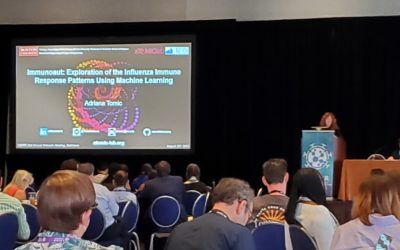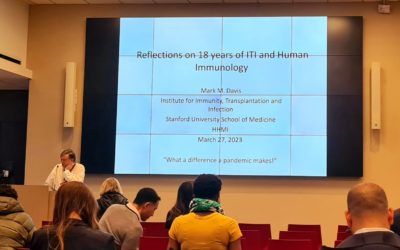Adriana Tomic from our team presented Atomic Lab's work on flu vaccination insights, using Artificial Intelligence (AI) at the prestigious Global Influenza Initiative (GII) by Sanofi. The GII assembled global experts from various medical fields with a shared goal to...
Human Immunology Conference in Greece
We had a blast at the 3rd Human & Translational Immunology Conference, held at the picturesque Rhodes, Greece! After a two-year wait, we were thrilled to join the fold as the world’s best human immunology conference made its grand comeback, and Atomic Lab was...
Visit to Human Immune Monitoring Center at Mount Sinai
Atomic Lab is thrilled to share that we were recently invited to the prestigious Human Immune Monitoring Center at Icahn School of Medicine at Mt Sinai. It was an incredible opportunity to be welcomed into such a renowned institution, brimming with inspiring,...
Vaccine Congress in Glasgow
Atomic lab presented its research on how AI can revolutionize vaccine development at the 17th Vaccine Congress in Glasgow! Many thanks for the invitation and opportunity to present our research to the organisers, Danny Altmann and Greg Poland. Proud to be a part of...
Hariri Institute Junior Faculty Fellow Award Ceremony
Adriana Tomic has been honored as a Junior Faculty Fellow at the Hariri Institute for Computing, Boston University, becoming a prominent part of the prestigious 2023 cohort of Hariri Fellows. This recognition validates not just Adriana's achievements as a systems...
CEIRR Meeting
Atomic Lab is extremely honored and thrilled to have been a part of the 2nd Annual CEIRR Network Meeting. CEIRR, Center of Excellence for Influenza Research and Response, is a collective that unites us in the common goal of fighting against the flu. We, at Atomic...
Welcome Matt
We're absolutely thrilled to announce the latest 'elementary particle' to join the Atomic Lab - Dr. Matt Fish! Hailing from King's College London, Matt completed his PhD under Professor Manu Shankar-Hari, mastering the intricacies of systems immunology. Joining as a...
FOCIS2023 – Big Data in Immunology
We're thrilled to take part in FOCIS2023, where Atomic Lab will highlight our latest research on AI and understanding human immune memory responses. Our presentation at the Big Data in Immunology workshop will showcase our cutting-edge free and open-source software...
Systems Cytomics – IWBMA2023
Exciting times ahead as we gear up for IWBMA (International Workshop on BioManufacturing Automation) at Boston University this June 12-14, 2023, where Atomic Lab will present our groundbreaking research on a robotic AI platform developed in collaboration with the DAMP...
ITI2023 Human Immune Monitoring Technology & Bioinformatics Conference
Excited to be back at Stanford University School of Medicine after four years! Reuniting with former Davis lab colleagues and rediscovering advancements in Systems Immunology have made this a memorable experience. Hats off to Mark Davis, Bali Pulendran, and Purvesh...









